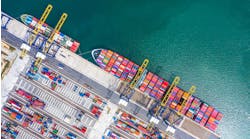Small and medium-sized enterprises (SMEs) in G7 and BRICM¹ economies that reach international markets are twice as likely to be successful as those that only operate domestically², according to a study which surveyed 410 SMEs. Of the SMEs surveyed by U.S.-based IHS Global Insight and DHL Express, 26% of those that traded internationally also significantly outperformed the market, while only 13% of domestic-only SMEs also outperformed the market. SMEs cited several key benefits of an international approach, including access to new markets and technology as well as stronger diversification of their products or services.
The study also highlighted that an inadequate business infrastructure can constrain a company’s competitiveness due to the reduction of business efficiency. For example, SMEs have to work harder to overcome infrastructure inefficiencies, particularly compared to larger companies with greater resources. The most significant concerns for SMEs that trade internationally are the lack of available information on foreign markets, high customs duties, the difficulty of establishing contacts with foreign partners and ability to successfully generate an overseas customer base.
Other key survey findings
SMEs that were founded in the last five years are more likely to have international business operations than older SMEs, despite having had less time to grow their businesses
U.S. SMEs benefit from a relatively efficient business environment, where labor productivity, for example, is higher than the G7 average. They also prosper from higher levels of R&D and innovation compared to the G7 average, but suffer from the bleak macro-economic backdrop in which they operate
The majority of SMEs who had out-performed their markets over the last three years indicated that they also planned to increase the percentage of exports in their turnover over the next three years, despite the uncertain economic environment
BRICM SMEs placed more emphasis on logistics as a positive influence on their international operations than their G7 counterparts, suggesting that they rely more on efficient transportation and customs processes to overcome infrastructure obstacles
Most of the better-performing SMEs identified in the study employ over 50 people, underscoring the importance of resources in overcoming barriers to international growth
A real lack of reliable and up-to-date information about SMEs on a country-by-country basis significantly hinders business owners ability to “have a voice”
“The strong correlation between improved business performance and cross-border trade suggests that there is a clear benefit for SMEs in going global,” said Ken Allen, CEO, DHL Express. “International trade not only opens up new markets for their products and services, but also gives them access to international best practices and innovations. Perhaps most significantly, competing internationally forces them to sharpen their own internal operations and processes, which benefits their business in their home market as well as abroad.”
¹ BRICM means Brazil, Russia, India, China and Mexico
² Based on three-year compound annual growth rates, IHS and DHL Express research, September – November 2012.
³ The Office for Budget Responsibility, 5 December 2012
4The Committee on Industry, Research and Energy adopted by a large majority, a report on an ‘Internationalisation Strategy for European Small and Medium-Sized Enterprises’ on 18 September 2012


